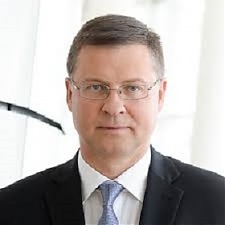Analytics, Covid-19, Crisis, Economics, EU – Baltic States, Financial Services, Latvia, Markets and Companies
International Internet Magazine. Baltic States news & analytics
Wednesday, 24.12.2025, 14:28
Economic recovery will depend on how many businesses and jobs are preserved - Dombrovskis
 Print version
Print version |
|---|
"As far as this year is concerned, we have to be prepared for a serious economic slump. Meanwhile, making forecasts about a more distant future would not be very useful because the severity of this year's slump and the speed of the recovery will depend on how the virus pandemic is overcome and how soon the restrictions on people's movements and others are lifted," Dombrovskis said, adding that it is the many restrictions that have halted economic activity.
He underlined that the economic recovery after the coronavirus pandemic will largely depend on how well Europe and Latvia manage to preserve businesses and jobs.
The European Commission's vice-president for the euro and social dialogue said that the European Union's (EU) support measures, totaling around EUR 93 bn, are aimed at achieving these goals.
"If businesses and jobs are preserved wherever possible, the economy might recover quite quickly. If the crisis leads to more and more insolvencies and layoffs, it will result in long-term problems already in the phase of economic recovery," Dombrovskis said.
"The total European-level support is around EUR 93 bn, and we continue to work on possible additional support," Dombrovskis said.
The European Central Bank has approved an additional asset buying program, worth EUR 750 bn, to make financing available to member states on favorable terms.
Dombrovskis also noted that work is underway on the European Stability Mechanism's (ESM) instrument, which would allow member states to apply for ESM financing in the amount of 2% of the member states' GDP. This, however, would be the next step, Dombrovskis said, adding that for the time being all member states have sufficient means and access to financial markets to finance their support measures.
- 28.01.2022 BONO aims at a billion!
- 26.08.2021 LLC Dizozols Investments finalizes investment attraction deal with Crowdestor with record-high profits
- 25.01.2021 Как банкиры 90-х делили «золотую милю» в Юрмале
- 30.12.2020 Накануне 25-летия Балтийский курс/The Baltic Course уходит с рынка деловых СМИ
- 30.12.2020 On the verge of its 25th anniversary, The Baltic Course leaves business media market
- 30.12.2020 Business Education Plus предлагает анонсы бизнес-обучений в январе-феврале 2021 года
- 30.12.2020 Hotels showing strong interest in providing self-isolation service
- 30.12.2020 EU to buy additional 100 mln doses of coronavirus vaccine
- 30.12.2020 ЕС закупит 100 млн. дополнительных доз вакцины Biontech и Pfizer
- 29.12.2020 В Rietumu и в этот раз создали особые праздничные открытки и календари 2021








 «The Baltic Course» Is Sold and Stays in Business!
«The Baltic Course» Is Sold and Stays in Business!

